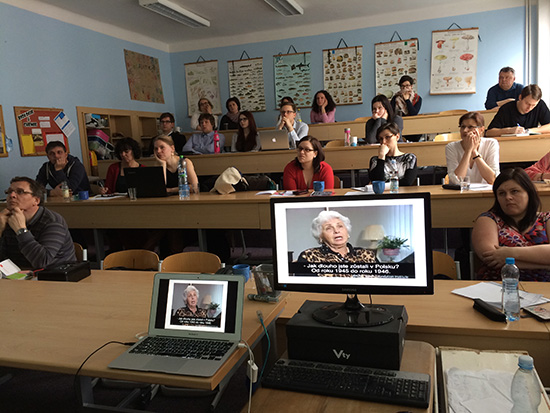IWitness Presented at Czech Seminar on Migration and Refugees


At the spring gathering of the Union of Civics Educators in Prague on March 19, teachers learned about IWitness as a tool for teaching about refugees.
At the one-day event, titled “Migration as a Phenomena in Civics and Social Sciences Education,” USC Shoah Foundation International Program Consultant Martin Šmok gave a presentation about Czech escapee and refugee experiences during the refugee waves of 1915, 1938, 1939, 1946 and 1948. Firsthand accounts of these experiences can be found in the testimonies in IWitness, which Šmok introduced to the attendees as a resource for their teaching.
Šmok showed several clips of testimony and discussed with the group topics including refugee experiences, refugee reception, enemy constructs involved in reactions to refugees, regarding refugees as individuals rather than members of a unified groups, and how to use IWitness.
The event also included presentations by Zdeněk Uherek, Director of the Institute of Ethology of the Academy of Sciences of Czech Republic, who spoke about statistics and facts of migration as opposed to media and political rhetoric, and Salim Murad, Ph.D. from University of South Bohemia in České Budějovice and Zuzana Vodňanská of META, an association for opportunities of young migrants.
Šmok has curated a Czech-language online exhibit about refugee experiences, called 200,000 Refugees in Trains. The exhibit provides background information about the Czech government’s response to the influx of Jewish refugees in July 1946, more than a year after the Nazi genocide of Jews ended. Czech authorities disseminated anti-Semitic propaganda saying that the refugees would bring disease, take away social services from citizens and become Zionist terrorists.
Clips from the testimonies of Louise Hermanová and Norma Dimitry, in Czech and English, illustrate the experiences of Jewish refugees just after World War II. The exhibit also provides relevant vocabulary terms and historical photographs of Jewish refugees from Poland traveling by train through Czechoslovak territory to displaced persons camps.
Like this article? Get our e-newsletter.
Be the first to learn about new articles and personal stories like the one you've just read.